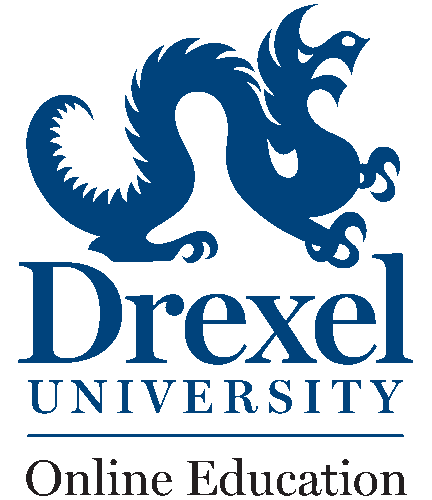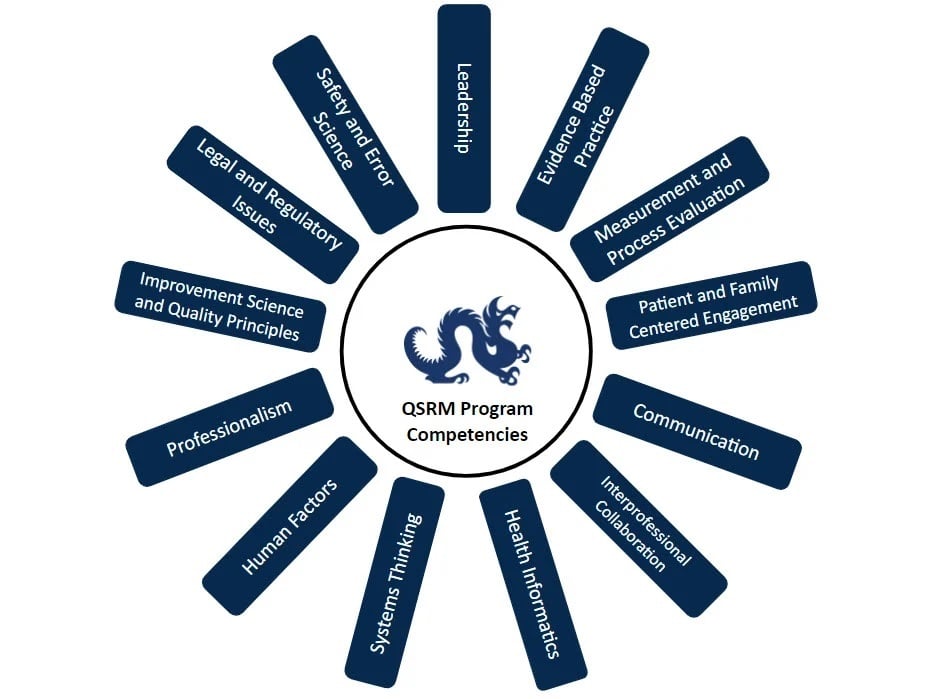


Requirements
and Restrictions
Learning Work?
or Live Event

MSN in Healthcare Quality, Patient Safety, and Risk Management Online Degree
Classes Begin: March 30, 20262 years
Fully Online
45
CCNE-accredited and CAHME certified
MSN in Quality, Safety, and Risk Management in Healthcare
Drexel’s online MSN in Quality, Safety, and Risk Management in Healthcare program draws from multiple disciplines. It’s ideal for working nurses who want to improve patient outcomes, reduce mortality rates, and create positive change in patient care.
The interdisciplinary patient safety and healthcare quality Master of Science in nursing program focuses on helping you build key competencies. You’ll learn how to enhance and monitor quality metrics, further safety for both patients and staff, and manage risks in a dynamic healthcare and nursing environment. Plus, the format enables you to learn and collaborate as you would in practice.
MSN in Healthcare Quality & Patient Safety Online Program at a Glance
- 46 quarter credits (equivalent of 30.67 semester credits)
- 100% online
- No on-campus residency requirement
- Ideal for nurses who want to take their career to new levels and impact quality, safety, and risk management in the healthcare industry
- Ranked #45 in Best Online Graduate Nursing Programs by U.S. News & World Report
- Ranked #12 in Best Online Graduate Nursing Programs for Veterans by U.S. News & World Report
- Learn from faculty members who are practicing experts in the fields of nursing, law, quality, patient safety, and risk management
- Study topics from a wide array of disciplines with the opportunity to learn and collaborate as you would in any practice setting
- The online format is highly interactive, challenging, and engaging while still fitting the schedule needs of working nurses and healthcare professionals
- Learn through realistic virtual simulation experiences through a partnership with faculty from Drexel’s state-of-the-art simulation center
- Three-year tuition lock for students who complete the program within three years
- The MS program is certified by CAHME and the MSN program is accredited by CCNE and certified by CAHME. CAHME serves the public by advancing the quality of healthcare management education globally. CAHME is an interdisciplinary group of educational, professional, clinical, and other health sector organizations devoted to quality improvement of education for healthcare management and administration professionals.
Program Mission, Vision, and Values
Mission
The mission of this program is to educate the next generation of leaders who will advance quality in healthcare. Through a focus on the core values of innovation, interdisciplinary collaboration, data-driven decision making, inclusion, and equity, the program prepares students to influence change and improve care across the continuum. The current landscape in healthcare requires preparation for interdisciplinary collaboration to support optimal outcomes. The program’s curriculum provides students with interdisciplinary and experiential learning opportunities that support development of knowledge and skills needed to collaboratively solve complex issues in healthcare and improve outcomes.
Vision
The QSRM program aspires to expand our national and international reputation as a leader in quality and patient safety education. The program aims to produce highly skilled, innovative individuals with the knowledge and skills needed to improve the quality and value of healthcare, preparing them to lead in a demanding and dynamic healthcare arena.
Values
Interdisciplinary Collaboration, Innovation, Data-Driven Decision Making, Inclusion, and Equity.
Quality, Safety, and Risk Management Capstone Project
The capstone project provides an opportunity to deepen your newly acquired nursing skills, while developing additional competencies needed to be successful in quality, safety, and risk management in healthcare. It's designed to provide an opportunity to integrate core and support course content related to improvement capability, patient safety, triple aim for populations, person- and family-centered care, leadership, and quality, cost, and value. The capstone project allows you to apply the knowledge learned throughout the program and demonstrate competency in the skills related to QSRM. You have the ability to complete the capstone project at your place of employment, allowingyou to make a meaningful contribution to quality and safety at your organization.
What is an MSN in Patient Safety & Quality Improvement Degree?
An MSN in Patient Safety and Healthcare program is designed for Registered Nurses (RNs) seeking to study the various ways to oversee and advance protocols for patient care in clinical settings.
You’ll learn through classwork and hands-on experiences that apply principles you’ve learned throughout the program to realistic, high stakes simulated activities. While sharing core interdisciplinary requirements, there are two kinds of degree options within this program, each one containing different course sequences and requirements:
- Master of Science in Nursing (MSN) – designed for nurses
- Master of Science (MS) – designed for healthcare professionals
Master of Science in Nursing (MSN)
The MSN sequence integrates the Essentials of Master’s Education in Nursing (AACN, 2011), Nurse Practitioner Core Competencies (NONPF, 2014), and QSEN Graduate Competencies (AACN, 2012).
It’s designed for students who have earned a BSN from an institution accredited by the National League for Nursing (NLN) and/or the American Association of Colleges of Nursing (AACN) and have a valid RN license. Or, for students who have an accredited bachelor’s degree or an ASN and have a valid RN license.
Master of Science (MS)
The MS sequence includes a wide range of courses from different disciplines, with similar content as the NURS counterpart courses.
It’s designed for students who have earned their bachelor’s degree from a regionally accredited university. It is also preferable to have healthcare experience.
What Can You Do with an MSN in Patient Safety and Quality Improvement Degree?
An MSN in patient safety and quality improvement might be useful in the pursuit of leadership roles within public and private sectors. Per the Bureau of Labor Statistics, the field of occupational health and safety is experiencing fast growth, adding new jobs at a rate of 15% through 2033.
After earning your degree, you can apply your knowledge and skill sets across community-based care delivery settings, hospitals, and other healthcare organizations. While job titles vary depending on where you work, you could look for positions such as:
- Director of Risk Management
- Director of Quality and Patient Safety
- Healthcare Risk Manager
- Patient Safety Officer
- Performance Improvement Advisor
- Quality Improvement Coordinator
Upon completion of this program, you will have gained the skills necessary to:
- Apply a legal and ethical framework of health care delivery
- Further the role of the quality, safety, and risk management professional in the health care system through scholarship, clinical experience, and organizational involvement
- Demonstrate critical thinking and diagnostic reasoning skills in decision-making
- Integrate multiple technologies and relevant theories into the organization and synthesis of health data to care for patients, families, and communities
- Integrate culturally sensitive care that contributes to the health and wellness of the community
- Demonstrate leadership through the development of outcome-based standards of care and practice-based health policy issues
- Drive the quality and effectiveness of care based on current research findings, standards of care, and patient outcomes
- Contribute to the advancement of health care and humanity through communication, interprofessional collaboration, and education
Graduation Rate
| Year Admitted | Graduation Rate (Years to Program Completion) |
|---|---|
| 2017 | 2.7 years |
| 2018 | 2.8 years |
| 2019 | 2.3 years |
| 2020 | 2.2 years |
| 2021 | 1.7 years |
Program Competencies

For more information on the QSRM program competencies, please visit the QSRM page on the College of Nursing and Health Professions website.
MSN in Patient Safety and Quality Improvement Salary Expectations
Patient safety officers working in state, local, and private hospitals earned a median annual wage of $83,910 in 2024. In the broader industry, salaries range from $50,610 to more than $130,460. In any field, salaries will fluctuate, due to location, clinical settings, and other factors.
Online Open Houses
Learn more about this and other nursing programs from our previously recorded online open house webinar series.
Questions? We're here to help!
For application related questions:
enroll@drexel.edu
For program related questions:
College of Nursing and Health Professions Program Team
CNHPGraduateDivision@drexel.edu
Related Program
Drexel University offers a variety of Graduate Minors that can be added to any master's degree program.
State restrictions may apply to some programs.
The MSN program at Drexel University is accredited by the Commission on Collegiate Nursing Education.
Curriculum
This program is organized into four 10-week quarters per year (as opposed to the traditional two semester system) which means you can take more courses in a shorter time period. One semester credit is equivalent to 1.5 quarter credits.
Graduate students who utilize student loans (FAFSA) muct maintain a minimum enrollment of 4.5 credits per term.
| Core Courses | ||
| NURS 500 | Confronting Issues in Contemporary Health Care Environments | 3.0 |
| NURS 502 | Advanced Ethical Decision Making in Health Care | 3.0 |
| NURS 544 | Quality and Safety in Healthcare | 3.0 |
| RSCH 503 | Research Methods and Biostatistics | 3.0 |
| RSCH 504 | Evaluation and Translation of Health Research | 3.0 |
| Major Courses | ||
| IPS 584 | Analysis of Performance Standards in Healthcare Quality | 3.0 |
| IPS 585 | Science of Safety, Human Factors, and System Thinking | 3.0 |
| IPS 587 | Safety Culture in Healthcare | 3.0 |
| IPS 601 | Quality, Safety and Risk Management Capstone | 5.0 |
| LSTU 551 | Compliance Skills: Auditing, Investigation & Reporting | 4.0 |
| LSTU 600 | Health Care Rules and Regulations | 4.0 |
| LSTU 601 | Health Care Quality, Patient Safety and Risk Management | 4.0 |
| LSTU 602 | Patients and Privacy: HIPAA and Related Regulations | 4.0 |
| Total Credits | 45.0 | |
Admissions Criteria
- A bachelor’s degree from a regionally accredited college or university
- BSN degrees must be from an institution accredited by CCNE (Commission on Collegiate Nursing Education), ACEN (Accreditation Commission for Education in Nursing), or NLN CNEA (NLN Commission for Nursing Education Accreditation)
- Nurses with a non-nursing bachelor's may consider applying for the RN-BSN-MSN program to earn both a BSN and MSN concurrently, or apply to the RN to MSN Bridge Program.
- GPA of 3.0 or above on all previous coursework or last 60 credits completed
- Applications with a GPA of less than 3.0 may be considered on an individual basis
- While specific clinical work and/or volunteer experience is not required, it may make your application more competitive.
Required Documents
With multiple ways to submit documents, Drexel makes it easy to complete your application. Learn more by visiting our Completing Your Application Guide.
- A completed application
- Official transcripts from all universities or colleges and other post-secondary educational institutions (including trade schools) attended
- Two professional letters of recommendation from previous or current supervisors, managers, faculty members, or program directors who can attest to your knowledge, skill, and potential aptitude for graduate study
- Letters must include the address, phone number, and signature of your recommender
- Letters are waived for those with a GPA of 3.0 or higher
- Personal statement (no more than two pages and no less than one page double-spaced) that will give the admissions committee a better understanding of:
- Why you're choosing this program of study
- Your plans upon completion of the degree
- How your current work experience will enhance your experience in this program
- Resume
- Copy of your current U.S. Registered Nurse license
- Additional requirements for International Students
An admissions interview may be required
Tuition
The tuition rate for the academic year 2025-2026 is $1169 per credit. (A 10% tuition savings off Drexel's regular tuition rate of $1298 per credit)
For the academic year 2025-2026, students enrolled in an online graduate academic program will be charged a graduate online program fee of $125 per year.
- This program is eligible for Financial Aid.
- Special tuition rates available for Drexel University Alumni, Military members, and members of our Partner Organizations.
- These rates apply only to new online students and students being readmitted.
- These rates apply only to fully online courses. Hybrid or on-campus courses may have different rates.
- Tuition rates are subject to increase with the start of each academic year in the fall term.
- All students must contact applyDUonline@drexel.edu within the first two weeks of the term to request tuition savings for which they qualify.
- Special rates cannot be combined. If you qualify for more than one special rate, you'll be given the one with the largest savings.
- When receiving special tuition plans, you may not be able to combine them with other tuition benefits that may be available from Drexel University.
Academic Calendar
2025-2026 Academic Year
Term
Classes Begin
Classes End
Exams Begin
Exams End
Fall 2025
September 22, 2025
December 6, 2025
December 8, 2025
December 13, 2025
Winter 2026
January 5, 2026
March 14, 2026
March 16, 2026
March 21, 2026
Spring 2026
March 30, 2026
June 6, 2026
June 8, 2026
June 13, 2026
Summer 2026
June 22, 2026
August 29, 2026
August 31, 2026
September 5, 2026


© All Rights Reserved

